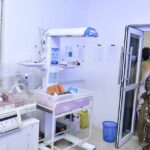The National Association of Proprietors of Private Schools (NAPPS) in Nigeria has expressed readiness to join forces with Afrikindness, a UK-based charitable organisation for children and young adults, and other stakeholders to stamp out the menace of examination malpractice from Nigeria’s educational system or reduce it to the barest minimum.
The menace, which continues to remain a big challenge in Nigeria and elsewhere globally, was the focal point of discourse at a virtual teachers’ training workshop organised recently by the NAPPS in Nigeria.
The forum, held in conjunction with Afrikindness, has “Promoting Integrity: Strategies for Mitigating Examination Malpractice in Schools” as a theme.
Speaking at the event, the National President of NAPPS, Yomi Otubela, stressed the importance of the training, saying it is for educators to gain knowledge on how and why they would need to take proactive measures against exam malpractice in schools.
He said it is important for educators as well as learners and other stakeholders to always uphold the principles of honesty, transparency, accountability and integrity on exams and certificates coming out of an educational system.
ALSO READ: FG cautions secondary school students on exam malpractice, vices
Condemning exam malpractice in all its forms, Otubela, who is also the chairman of Lagooz Group of Schools, said the growing concern on exam malpractice in recent times in the country has really threatened the credibility and integrity of educational institutions.
He noted that the workshop was designed to provide participants, who are school owners and administrators as well as teachers with opportunities to share ideas, insights, expertise, strategies and best practices to effectively bring exam malpractice to kneel locally.
He pointed out that the adverse consequences of exam malpractice are not limited to cheaters and those who aided it but extend to the education sector, the economy and society in general.
He said that was why fighting the menace and achieving success required collective efforts of stakeholders with educators taking an active role.
According to him, educators in general must be able to promote a culture of academic honesty, and ethical behavior among students and also themselves.
He said a situation whereby teachers and even parents encourage their students and children as the case may be to engage in exam malpractice is not only unheard of and bad but totally condemnable.
He therefore called on participants to work together to instill a sense of integrity and ethical values in the country’s educational system by fostering a generation of young leaders, who will uphold the highest standards of moral conduct in school and after graduation. See Microsoft AZ-900 Practice Test Dumps
In their separate contributions, the Chief Executive Officer of Afrikindness, Bunmi Owolabi and two other speakers, Lovette Monyei and Alice Crawford, said educators are expected to prepare learners at all levels for future challenges.
They explained that it is only when educators prepare students well with the right knowledge and skills as well as moral values, emotional intelligence, self-management, and so forth that they would be able to stand and contribute meaningfully to societal advancement.
They said the essence of children going to school is to become productive citizens even while still in school, urging participants to make good use of knowledge gained at the workshop back home.
WATCH TOP VIDEOS FROM NIGERIAN TRIBUNE TV
- Relationship Hangout: Public vs Private Proposals – Which Truly Wins in Love?
- “No” Is a Complete Sentence: Why You Should Stop Feeling Guilty
- Relationship Hangout: Friendship Talk 2025 – How to Be a Good Friend & Big Questions on Friendship
- Police Overpower Armed Robbers in Ibadan After Fierce Struggle






